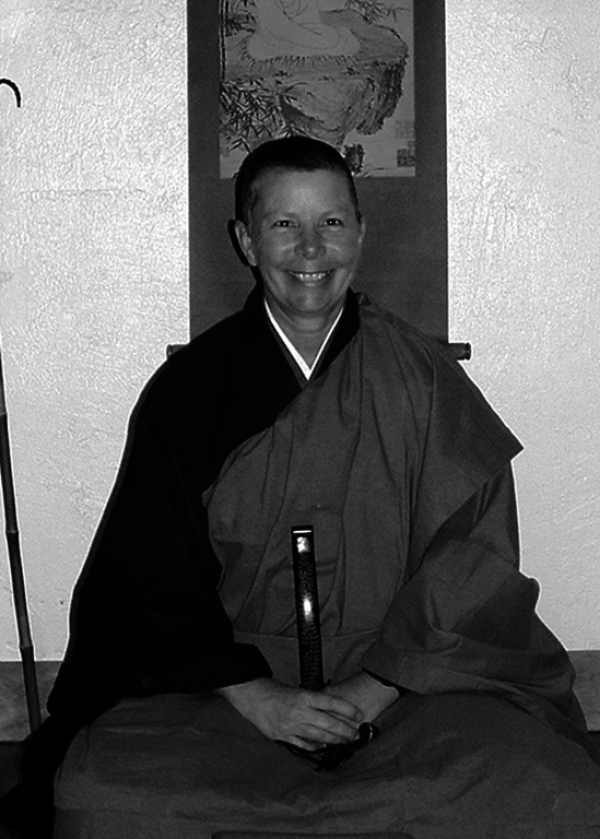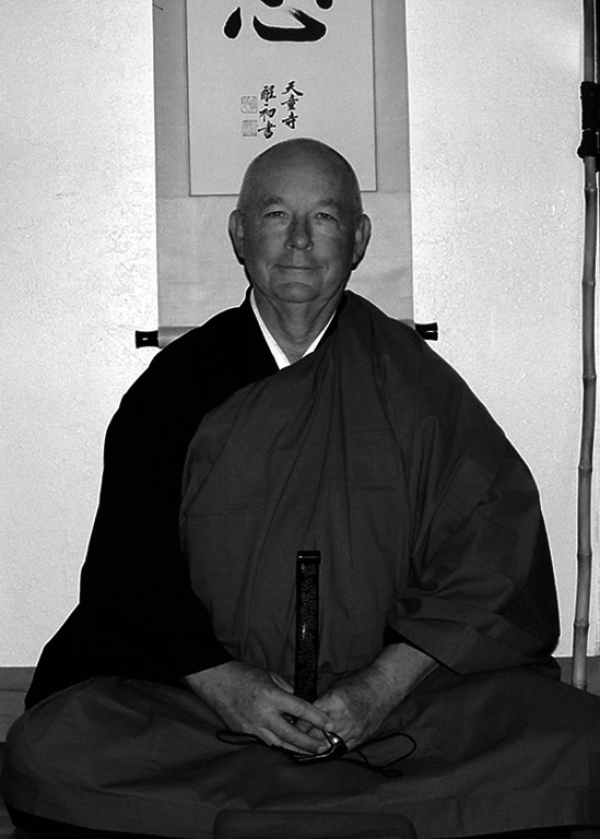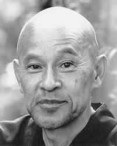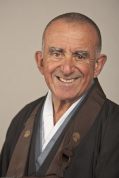History
Ashland Zen Center began in 1992 when Jintei Harold Little Roshi and Etsudo Patty Krahl Roshi moved to the Rogue Valley of Southern Oregon. They set up a few meditation cushions in their living room and soon a small group of people were joining them every week to learn how to sit zazen.
By the following year the group had grown in numbers and were invited to practice at a larger space, the Siskiyou Aikikai Dojo. Beginning to feel like a community, the nascent sangha adopted the
name Siskiyou Sansui Sangha. The name of a mountain range in our region, Siskiyou, is an Indian word for moving mountains; sansui is Japanese for mountains and waters; and sangha means a Buddhist
community. Our name comes from the environment in which we live and practice, and expresses simply what we are. This temple name eventually changed to Siskiyou Sansui Do when we settled into a
rental.
By the spring of 1999 the sangha’s commitment to offering Zen practice to the greater Rogue Valley led us to our first dedicated facility, leased at 246 Fourth Street, and to our incorporation in the
state of Oregon as a 501(c)(3) non-profit organization. At that time our common name became Ashland Zen Center.
At Fourth Street we were able to expand our practice opportunities, set up a founders’ altar, begin a library, and operate with a full kitchen and our own garden. We practiced at Fourth Street for six and a half years. True to the sangha’s intention, having a high-profile presence in the community allowed many people to get a taste of Zen practice.
During that time our sangha overflowed the small house, leading us to consider the need for a permanent Zen Center in Ashland. As a group we decided that was what we wanted. We conducted a fund drive in order to purchase and create our own center, and in 2003 we bought three-quarters of an acre on Tolman Creek Road that had an old barn, cottage, farmhouse and 80-foot tall Grandfather Cottonwood tree on it.
In 2005 we completed a remodel on the farmhouse to create a 14-seat zendo and a remodel on the barn to create a sangha meeting room and moved to 740 Tolman Creek Road. Practice expanded again to include activities in a memorial garden, vegetable garden, altar flower cutting garden, berry orchard and fruit orchard. We remodeled the cottage as a rental and it became a refuge for people seeking sanctuary and an income stream to support Zen practice.
In 2014 the property next to the Zen Center was donated to the sangha as well as the money to build a residence hall. We spent the next three years clearing the land and designing and building new spaces for sangha use. In 2018 the building was completed. The new buildings include five apartments, a community dining room, community kitchen, and a ceramics studio.
Ashland Zen Center's Founding Teachers
Abbess Etsudo Patty Krahl
Abbess Etsudo Patty Krahl is co-founder of Siskiyou Sansui Do, Mountains and Waters Way, also known as Ashland Zen Center in Ashland, Oregon.
She received the precepts in Shukke Tokudo in 1994 from her teacher, Keido Les Kaye Roshi, Abbot of Kannon Do in Mountain View, California.
In February 2004, Keido Roshi bestowed Dharma Tranmission in the lineage of Shunryu Suzuki Roshi in ceremonies at Kannon Do and San Francisco Zen Center.
On October 2004, she was recognized by the colloquy of North American Soto Zen teachers at Dharma Heritage ceremony through the Soto Zen Buddhist Association.
Abbot Jintei Harold Little
Abbot Jintei Harold Little is co-founder of Siskiyou Sansui Do, Mountains and Waters Way, also known as Ashland Zen Center in Ashland, Oregon.
He received the precepts in Shukke Tokudo in 1990 from his teacher, Keido Les Kaye Roshi, Abbot of Kannon Do in Mountain View, California.
In February 2004, Keido Roshi bestowed Dharma Tranmission in the lineage of Shunryu Suzuki Roshi in ceremonies at Kannon Do and San Francisco Zen Center.
On October 2004, he was recognized by the colloquy of North American Soto Zen teachers at Dharma Heritage ceremony through the Soto Zen Buddhist Association.
Teachers at Ashland Zen Center
Tendo Stacy Waymire received the precepts in Shukke Tokudo from his teacher Jintei Harold Little Roshi in 2010. In 2016 he was Shuso at Ashland Zen Center. In May 2021, Jintei Roshi bestowed Dharma Tranmission in the lineage of Shunryu Suzuki Roshi.
Kigetsu Ramana Waymire received the precepts in Shukke Tokudo from her teacher Jintei Harold Little Roshi in 2010. In 2017 she was Shuso at Ashland Zen Center.In May 2021, Jintei Roshi bestowed Dharma Tranmission in the lineage of Shunryu Suzuki Roshi.
Lineage
Ashland Zen Center's teachers are dharma entrusted in the lineage of Shunryu Suzuki Roshi.
Shunryu Suzuki Roshi was a Japanese Soto Zen priest who came to San Francisco in 1959 at the age of 55 and taught in America until his death in 1971. He was one of a small group of influential first generation Japanese teachers of Zen in America who spread the dharma seeds that have come to root through their second, third, fourth and fifth generation lineage entrusted students.
Keido Les Kaye Roshi, Abbot Emeritus of Kannon Do in Mountain View, California, was ordained as a Zen monk by Shunryu Suzuki in 1971 and was appointed spiritual leader of Kannon Do in 1982. In 1986, he was recognized as a Zen teacher and a successor in the lineage of Shunryu Suzuki.
Keido Roshi is the author of several books, including "Zen at Work," published by Three Rivers Press in 1997, and "A Sense of Something Greater: Zen and the Search for Balance in Silcon Valley," published by Parallax Press in 2018.
Sister Sanghas
Ashland Zen Center's sister sanghas through Keido Les Kaye Roshi, Abbot Emeritus of Kannon Do in Mountain View, California are:
Zen Heart Sangha in Woodside, California
Casco Zen Center in Casco, Maine
Middle Way Zen in San Jose, California
Zendo du Boulay in Normandy, France
Ashland Zen Center is an affiliate center of Branching Streams, a network of dharma centers in the lineage of Shunryu Suzuki Roshi.




